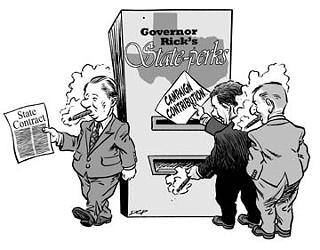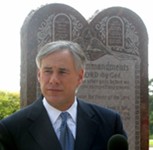Perry's Big $$$ Ideas
The governor reaches for a legacy – is anybody listening?
By Amy Smith, Fri., March 2, 2007
Two years ago, when Rick Perry was ramping up his re-election campaign, the Methodist Aggie governor got all Christian on us. Ripping a page from Karl Rove's 2004 playbook, Perry commenced to court the social conservative vote. He met privately several times with a shadowy network of fundamentally right-wing ministers called the Texas Restoration Project, a well-oiled political machine that sprang to life fully formed in 2005. The group's religious status made it exempt – at least technically – from the state's campaign finance disclosure laws. The group's No. 1 goal that year was to register 300,000 voters to help pass a constitutional ban on gay marriage and, theoretically, help swing a payback victory for Perry the following year.
Entering the 2005 legislative session, Perry struck all the right notes in his State of the State address: He talked tough on education reform (his answer for a court-ordered revision of the school-finance system), solidified his pro-life stance, voiced support for private-school vouchers, and credited tort reform with saving the state of health care in Texas. "Patient access is improving," he told an appreciative audience, "because the personal-injury trial lawyers are no longer calling the shots."
Perry also chatted up his Trans Texas Corridor project then taking shape, "with the private sector willing to expend $7.2 billion up front without asking for one dime in state money for construction." By the end of the regular session, and three special sessions that followed, Perry was still talking tough on school reform while the school-funding matter went unresolved. To finally get the job done and keep his political career intact, Perry summoned former comptroller and Democratic rival John Sharp and put him in charge of crafting a new franchise-tax bill and recruiting support from enough Democratic legislators to add some bipartisan flair to its passage.
All things considered, Perry's 2005-2006 election campaign ran pretty smoothly, even with three major opponents on the ballot and a majority of Texans voting for someone other than Perry, leaving him with a modest yet decisive 39% victory.
Last month, the Capitol buzz held that Perry's grandstanding and cocksureness since the election were getting on people's nerves, as well as fueling rumors that Perry was auditioning for the role of Republican vice presidential nominee in 2008. His handlers continue to insist that he's not interested and that he doesn't even like Washington. Of course, that's also what his predecessor said.
Skepticism regarding Perry's ambitions isn't hard to find. Republican consultant Royal Masset doesn't see a VP spot in the cards. "Texas has already had our share of VPs and presidents. People may want a breather from Texas leaders, who tend to 'Alamocize' international conflicts," he said. And even if George Bush weren't in the White House, he added, U.S. Sen. Kay Bailey Hutchison would be a more likely VP candidate. "Perry is wise to keep his options open," Masset said, "but his advisers need to be telling him that if the heavens open up and put a Texan in the presidency [ticket] in 2008, it will be Hutchison, not Perry."
Pigpen Rick
Whatever its impetus, Perry's current grandstanding – and the backlash against it – has been the talk of the 80th Legislature. It is also why members of his own party, with ample and eager assistance from Democrats, are taking unprecedented measures to rein him in. Just 60 days into his third term in office, the impeccably groomed governor has become a political version of Pigpen, the Peanuts character whose trademark is a constant cloud of dust that follows his every move. Here is a recap of some of Perry's 60 days of dustups:
The Human Papillomavirus Mandate: Perry issued an executive order on Feb. 2, to require sixth-grade girls to be vaccinated for a sexually transmitted virus that can cause cervical cancer. The mandate, which several legal experts have deemed unconstitutional, touched off a national debate. It also enraged conservatives who charge it will promote promiscuity. It also raised concerns about the safety of the recently introduced vaccination drug (Gardasil), as well as the aggressive legislative lobbying program launched by Merck & Co., the pharmaceutical company marketing the drug, to try to secure vaccine requirements in every state.
The vaccination program has its supporters, but overall, the response from the Lege has been swift and strong – this week, opponents announced a bill to overturn the executive order, with no less than 90 House co-sponsors. Perry (a Democrat in his former life in the House) appears to have waded boldly into the muddle – and gotten stuck. Indeed, the negative legislative and public reaction has been enough to make one wonder whether Perry or his advisers even considered doing any political groundwork before announcing such a peremptory decision. The Associated Press turned up the most notable fumble: Perry's chief of staff and other top aides met for an "HPV Vaccine for Children Briefing" on the same day last October that Merck donated $5,000 to Perry's campaign.
Republicans are long accustomed to brushing off questions about the governor's coziness with major-league lobbyists (a group that includes several former staff members). This time, his own party members were among the first to pounce on the connection between Perry and his friend and former chief of staff – Merck lobbyist Mike Toomey. In addition to filing reversal legislation, GOP lawmakers have sought a legal opinion from Attorney General Greg Abbott on the legality of Perry's directive. Even Merck has retreated; fearing a financial backlash from the media attention, last week the company pulled the plug on its national legislative campaign.
The Coal Plants: Same song, second verse. On Feb. 20, Travis Co. District Judge Stephen Yelenosky determined that Perry overstepped his authority in October 2005, when he ordered the state environmental agency to expedite the permitting review process for a controversial slew of proposed coal-fired power plants, 11 of them planned by utility giant TXU. (Replied Perry spokesman Robert Black, "No one should be surprised that a single, liberal Austin judge would rule against Governor Perry and his efforts to increase energy capacity in Texas.") Two weeks earlier, Perry vigorously defended coal plants in his State of the State address and warned that "power outages are just a few years away if we don't take action." Perry is willing to order a new-to-market vaccine for teenage girls – yet he dismisses public pleas to require power companies to use a clean, or rather cleaner, coal-burning technology known as integrated gasification combined cycle. His reason? "It remains unproven."
The Toll Roads: Texans are loudly up in arms over Perry's Trans Texas Corridor project, which his gubernatorial opponent and former Comptroller Carole Keeton Strayhorn fondly described as the "Trans Texas Catastrophe." Pouring highway concrete, second only to building prisons, has always been popular at the Lege. But as with the ever-burgeoning prison system, the urge to bulldoze is now bumping harshly against the ideological mandate never, never, never to raise taxes, even to build more roads. Perry has responded in what has become the reflexive Republican fashion – to privatize the problem by outsourcing the toll roads to corporate interests, domestic and foreign. The public reaction has been mixed, at best – accounting for much of the voter disapproval reflected in that 39% November mandate.
For this session, the toll roads retain plenty of momentum at the Capitol, and it's never safe to bet against the highway lobby. There is a move afoot in the Lege – driven mostly by Republicans – to stick a fork in the toll-road project that's bulldozing and land-grabbing its way across the state. Still, Gov. Perry considers the grandiose corridor plan a central aspect of his lengthening tenure as governor. It may take more than an economic recession to leave it stranded along the highway.
Privatizing the Lottery: Perry is pitching a plan to sell the Texas Lottery to a private company, which he believes would fetch $14 billion or more. Here's the catch: We need to act right now. "If we delay, the market price is likely to be less in the years to come," he said. "But if we act now, we can invest in our classrooms, laboratories, and hospitals, giving hope to those who need it most." Only later was it reported that the first to imagine the possibility of a lottery sale was none other than former U.S. Sen. Phil Gramm, a vice president of UBS – a financial services outfit that would likely be first in line to broker the deal.
Perry's son, Griffin, just happens to be a new hire at UBS, and former Perry spokesman Ray Sullivan is a UBS lobbyist. Sheer coincidence was the explanation from the governor's office, also quick to note that neither Griffin nor Sullivan are directly involved in the lottery deal. In any case, Perry's proposal calls for investing the money from the sale in three interest-earning funds, or trusts, to help finance a health-insurance plan for the uninsured, put more money into education, and turn Texas into a national leader in cancer research.
Lt. Gov. David Dewhurst and House Speaker Tom Craddick, no slouches in the financial market, are not going to be easily sold on the lottery idea. "We'll look at it," Dewhurst said, but he expressed doubt about the sale's ability to generate $750 million a year for education, as Perry said it would, and wondered how the state would make up for the shortfall.
Riding Into the Sunset
Considering these issues together, Democratic consultant Kelly Fero suggests a common thread: that Perry has used them as occasions to gradually increase his authority. "This session thus far highlights the fact that Rick Perry has taken the Texas governor's office from arguably the weakest in the nation, to arguably one of the strongest," he said, adding, "with just a 39% mandate and no constitutional vote."
Perry's theme for 2007 is "Imagine the Possibilities." It encompasses a hopeful-sounding set of proposals that he laid out in his inaugural address and his State of the State speech. In contrast to his 2005 State of the State, this year Perry went global, touching on terrorism and national security, and even condemning the ethnic genocide in the Darfur region of Sudan – not exactly an instinctive subject for a Texas governor. Even more surprisingly, he acknowledged that poverty does exist in Texas, and too many people are uninsured. There was none of his hard-nosed, old-time religion talk of yesteryear. Perry has some big ideas.
Perry would like us to imagine the possibilities as he sees them, but many on both sides of the aisle are starting to recognize those possibilities as political and financial gains for the governor and his friends. Masset, who is not on Perry's payroll and says he hasn't talked to him since last year, is one of a few Republicans these days willing to stick his neck out for Perry but isn't shy about pointing out his warts. "I think it's good Perry is using his office as a bully pulpit," he said. "Some of his ideas are incredibly stupid, like tuition deregulation and selling the lottery. But in our form of government, I think it's better we have a governor throwing out ideas for the future and forcing the Legislature to react." On Perry's connections to high-rollers and lobbyists, Masset responds, "It's hard for any leader to not have friends all over the place and be influenced by them." With that, Masset offered a philosophical view of Perry, drawing on his personal experience of what happens to men "when we hit our 50s."
"We know we will soon die, and we cling to power and money and want to accomplish great things before we go. This is Perry's last hurrah. Even by next session he'll be fading away, and we'll probably have Hillary in the White House." ![]()
*Oops! The following correction ran in our March 9, 2007 issue: In last week's "On the Lege: Perry's Big $$$ Ideas," Gov. Perry's spokesman was mistakenly identified as Perry Black. In fact, his name is Robert Black. We regret the error.
Got something to say on the subject? Send a letter to the editor.













